

What actions promote a positive ethical climate? A critical incident study. Ethical concerns and dilemmas of Finnish and Dutch health professionals.: EBSCOhost. Ethical problems and moral sensitivity in physiotherapy: A descriptive stud...: EBSCOhost. Chinese nurses’ perceived barriers and facilitators of ethical sensitivity: EBSCOhost. Background: An overview of ethical sensitivity among Chinese registered nurses is needed to develop and optimize the education programs and interventions to cultivate and improve ethical sensitivity.
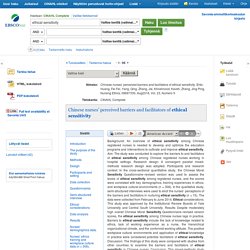
Aim: The study was conducted to explore the barriers to and facilitators of ethical sensitivity among Chinese registered nurses working in hospital settings. Research design: A convergent parallel mixed-methods research design was adopted. Participants and research context: In the cross-sectional quantitative study, the Chinese Moral Sensitivity Questionnaire–revised version was used to assess the levels of ethical sensitivity among registered nurses, and the scores were correlated with key demographics, training experiences in ethics, and workplace cultural environments (n = 306).
In the qualitative study, semi-structured interviews were used to elicit the nurses’ perceptions of the barriers and facilitators in nurturing ethical sensitivity (n = 15). Introduction The purpose of the study. Alzheimer Europe Reports - Publications - Alzheimer Europe. 2015 Alzheimer Europe Report: "Ethical dilemmas faced by health and social care professionals providing dementia care in care homes and hospital settings: a guide for use in the context of ongoing professional care training" Click here to download This publication is about the kinds of ethically challenging situations and ethical dilemmas faced by health and social professionals of all levels who provide care for people with dementia in care homes and hospital settings.
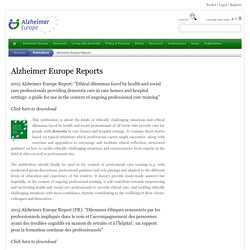
It contains short stories based on typical situations which professional carers might encounter, along with exercises and appendices to encourage and facilitate ethical reflection, structured guidance on how to tackle ethically challenging situations and commentaries from experts in the field of ethics as well as professional care. Click here to download Cette brochure s’adresse à l’ensemble des professionnels des secteurs sanitaire, social et médico-social qui accompagnent des personnes ayant des troubles cognitifs.
Coercion in nursing homes: EBSCOhost. Coercion in nursing homes: EBSCOhost. Ethical climate and nurse competence – newly graduated nurses' perceptions: EBSCOhost. Moral distress experienced by nurses: A quantitative literature review.: EBSCOhost. ‘Moral distress’ – time to abandon a flawed nursing construct?: EBSCOhost. The experiences of people with dementia and intellectual disabilities with. EBSCO Publishing Service Selection Page. Older people’s experiences of their free will in nursing homes: EBSCOhost. Background: Older people in institutional care should be allowed to live a meaningful life in a home-like environment consistent with their own free will.
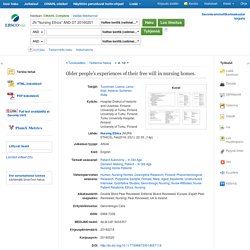
Research on actualisation of older people’s own free will in nursing home context is scarce. Objectives: The purpose of this study was to describe older people’s experiences of free will, its actualisation, promoters and barriers in nursing homes to improve the ethical quality of care. Research design: Fifteen cognitively intact older people over 65 years in four nursing homes in Southern Finland were interviewed. Giorgi’s phenomenological method expanded by Perttula was used to analyse the data. Ethical considerations: Chief administrators of each nursing home gave permission to conduct the study. Experience; free will; nursing home; older people; phenomenological method Background All older people do not age healthy preserving their functional capacity, but have to rely on institutional care. Methods Sample Interviews Interview guide. Nothing to complain about? Residents’ and relatives’ views on a “good life”...: EBSCOhost. Background: Nursing home residents are a vulnerable population.
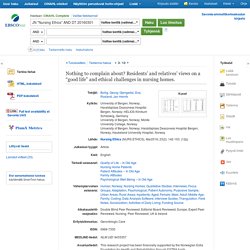
Most of them suffer from multi-morbidity, while many have cognitive impairment or dementia and need care around the clock. Several ethical challenges in nursing homes have been described in the scientific literature. Most studies have used staff members as informants, some have focused on the relatives’ view, but substantial knowledge about the residents’ perspective is lacking. The meaning of vulnerability to older persons: EBSCOhost. Background: Vulnerability is an important concept in nursing and nursing ethics.
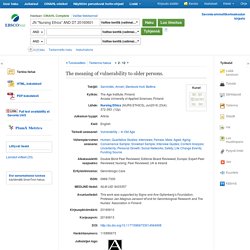
Vulnerability and ageing have generally been associated with frailty, which gives a limited view of both vulnerability and ageing. Objective: The aim of this study was to illuminate the meaning of vulnerability to older persons themselves. Research design: A qualitative design based on interpretive description was adopted. The data were collected by interviews that were analysed by qualitative content analysis as interplay between analysis, interpretation and meaning construction. Participants and research context: In total, 14 older persons aged 70–96 years were interviewed, 2 men and 12 women. Ageing; existentialism; frailty; interpretive description; personal development Introduction Vulnerability is an important concept in nursing and nursing ethics.
Vulnerability is often equalled with frailty. Ethical aspects of caregivers’ experience with persons with dementia at mea...: EBSCOhost. Background: Persons with dementia are at risk of malnutrition and thus in need of assistance during mealtimes.
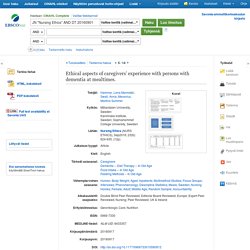
Research suggest interventions for caregivers to learn how to facilitate mealtimes and eating, while other suggest a working environment enabling the encounter needed to provide high-quality care. However, the phenomenon of caring for this unique population needs to be elucidated from several perspectives before suggesting suitable implications that ensure their optimal health. Objectives: To illustrate the meanings within caregivers’ experiences of caring for persons with dementia during mealtime situations. We also measured weight and food intake among individuals with dementia to explain better the phenomenon of caring for them during mealtimes. Methods: Mixed method including focus group interviews with seven caregivers analyzed using phenomenological hermeneutics. Background A basic survival need is intake of sufficient food and liquid.
Methods. Ethical aspects of caregivers’ experience with persons with dementia at mea...: EBSCOhost. Tulosluettelo: JN "Nursing Ethics" AND DT 20160901: EBSCOhost.